Article Review: Influence of Mentors on Business Graduates' Ethics
VerifiedAdded on 2020/04/21
|7
|1410
|52
Report
AI Summary
This report is an article review that examines the ethical attitudes and decision-making processes of female business graduates in the United Arab Emirates. The review focuses on an empirical study that investigates the influence of mentors and organizational climate on these graduates. The study addresses the changing ethical landscape in the UAE, moving from a traditional society to a more commercialized one. The review highlights the hypotheses, research methodologies, and key findings of the study, including the positive impact of mentors on ethical perceptions and the influence of peers and workplace scenarios. The conclusion emphasizes the importance of ethical education, organizational support, and the need for further research with larger sample sizes to fully understand the factors influencing ethical behavior in both educational and professional settings. The report also mentions the role of the university curriculum and the need for organizations to maintain ethical standards.
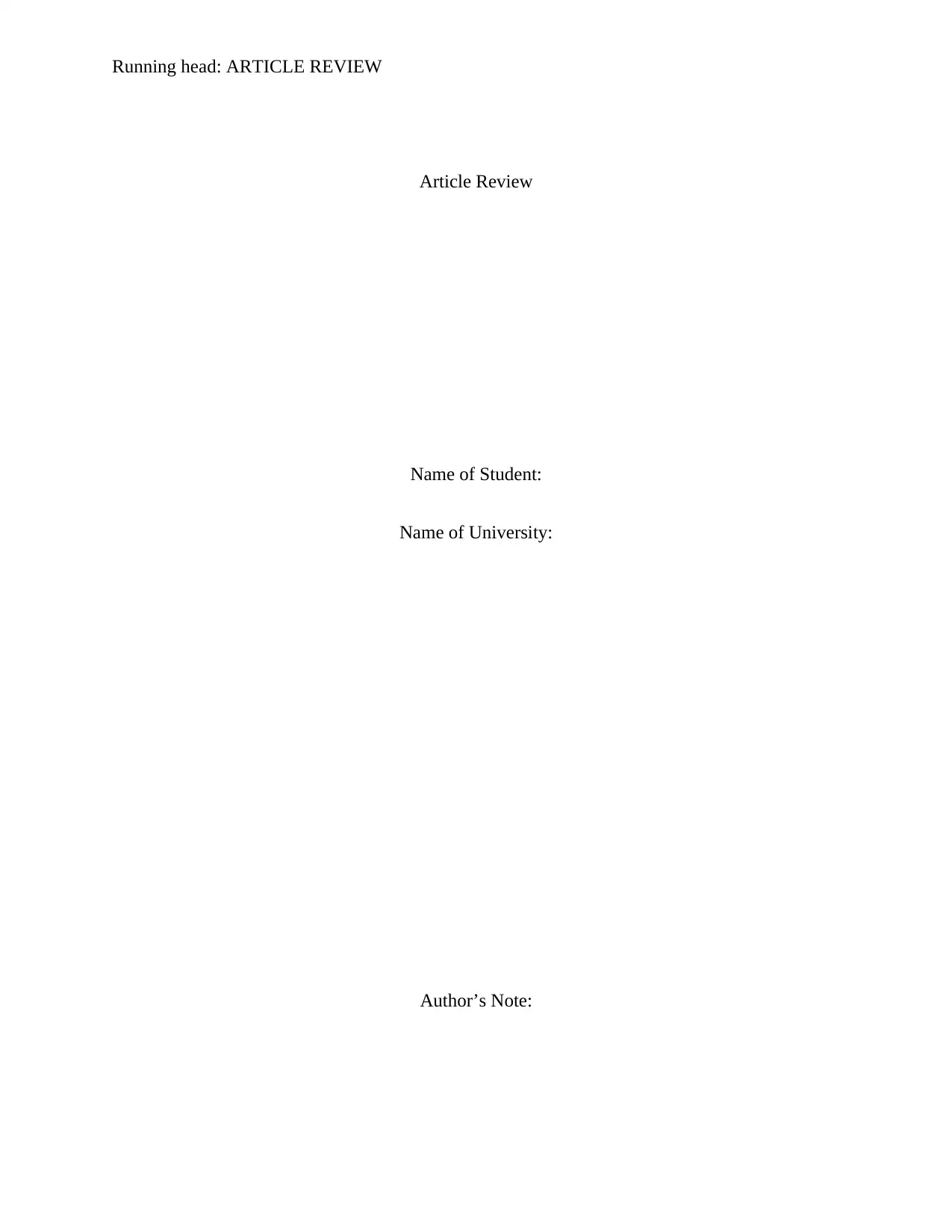
Running head: ARTICLE REVIEW
Article Review
Name of Student:
Name of University:
Author’s Note:
Article Review
Name of Student:
Name of University:
Author’s Note:
Paraphrase This Document
Need a fresh take? Get an instant paraphrase of this document with our AI Paraphraser
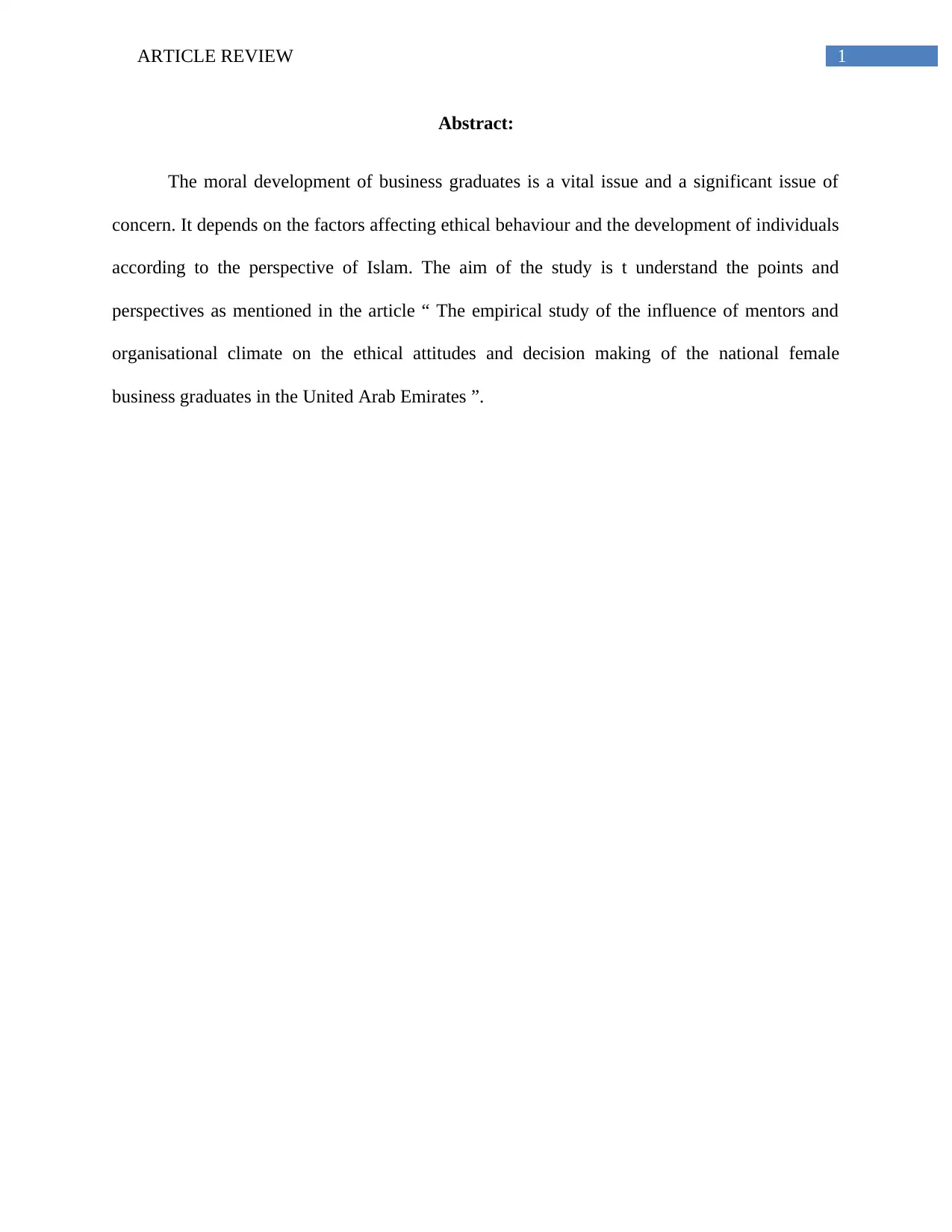
1ARTICLE REVIEW
Abstract:
The moral development of business graduates is a vital issue and a significant issue of
concern. It depends on the factors affecting ethical behaviour and the development of individuals
according to the perspective of Islam. The aim of the study is t understand the points and
perspectives as mentioned in the article “ The empirical study of the influence of mentors and
organisational climate on the ethical attitudes and decision making of the national female
business graduates in the United Arab Emirates ”.
Abstract:
The moral development of business graduates is a vital issue and a significant issue of
concern. It depends on the factors affecting ethical behaviour and the development of individuals
according to the perspective of Islam. The aim of the study is t understand the points and
perspectives as mentioned in the article “ The empirical study of the influence of mentors and
organisational climate on the ethical attitudes and decision making of the national female
business graduates in the United Arab Emirates ”.
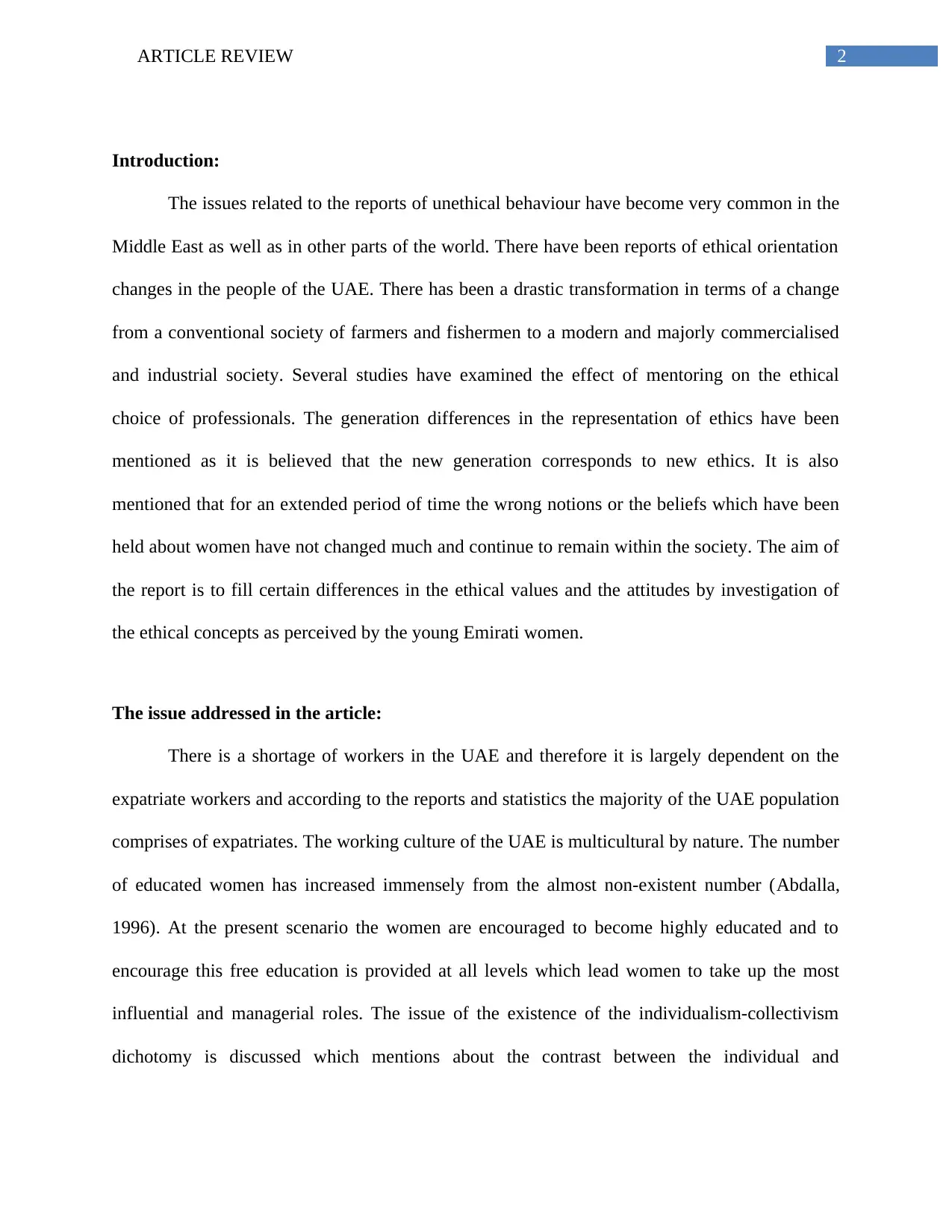
2ARTICLE REVIEW
Introduction:
The issues related to the reports of unethical behaviour have become very common in the
Middle East as well as in other parts of the world. There have been reports of ethical orientation
changes in the people of the UAE. There has been a drastic transformation in terms of a change
from a conventional society of farmers and fishermen to a modern and majorly commercialised
and industrial society. Several studies have examined the effect of mentoring on the ethical
choice of professionals. The generation differences in the representation of ethics have been
mentioned as it is believed that the new generation corresponds to new ethics. It is also
mentioned that for an extended period of time the wrong notions or the beliefs which have been
held about women have not changed much and continue to remain within the society. The aim of
the report is to fill certain differences in the ethical values and the attitudes by investigation of
the ethical concepts as perceived by the young Emirati women.
The issue addressed in the article:
There is a shortage of workers in the UAE and therefore it is largely dependent on the
expatriate workers and according to the reports and statistics the majority of the UAE population
comprises of expatriates. The working culture of the UAE is multicultural by nature. The number
of educated women has increased immensely from the almost non-existent number (Abdalla,
1996). At the present scenario the women are encouraged to become highly educated and to
encourage this free education is provided at all levels which lead women to take up the most
influential and managerial roles. The issue of the existence of the individualism-collectivism
dichotomy is discussed which mentions about the contrast between the individual and
Introduction:
The issues related to the reports of unethical behaviour have become very common in the
Middle East as well as in other parts of the world. There have been reports of ethical orientation
changes in the people of the UAE. There has been a drastic transformation in terms of a change
from a conventional society of farmers and fishermen to a modern and majorly commercialised
and industrial society. Several studies have examined the effect of mentoring on the ethical
choice of professionals. The generation differences in the representation of ethics have been
mentioned as it is believed that the new generation corresponds to new ethics. It is also
mentioned that for an extended period of time the wrong notions or the beliefs which have been
held about women have not changed much and continue to remain within the society. The aim of
the report is to fill certain differences in the ethical values and the attitudes by investigation of
the ethical concepts as perceived by the young Emirati women.
The issue addressed in the article:
There is a shortage of workers in the UAE and therefore it is largely dependent on the
expatriate workers and according to the reports and statistics the majority of the UAE population
comprises of expatriates. The working culture of the UAE is multicultural by nature. The number
of educated women has increased immensely from the almost non-existent number (Abdalla,
1996). At the present scenario the women are encouraged to become highly educated and to
encourage this free education is provided at all levels which lead women to take up the most
influential and managerial roles. The issue of the existence of the individualism-collectivism
dichotomy is discussed which mentions about the contrast between the individual and
⊘ This is a preview!⊘
Do you want full access?
Subscribe today to unlock all pages.

Trusted by 1+ million students worldwide
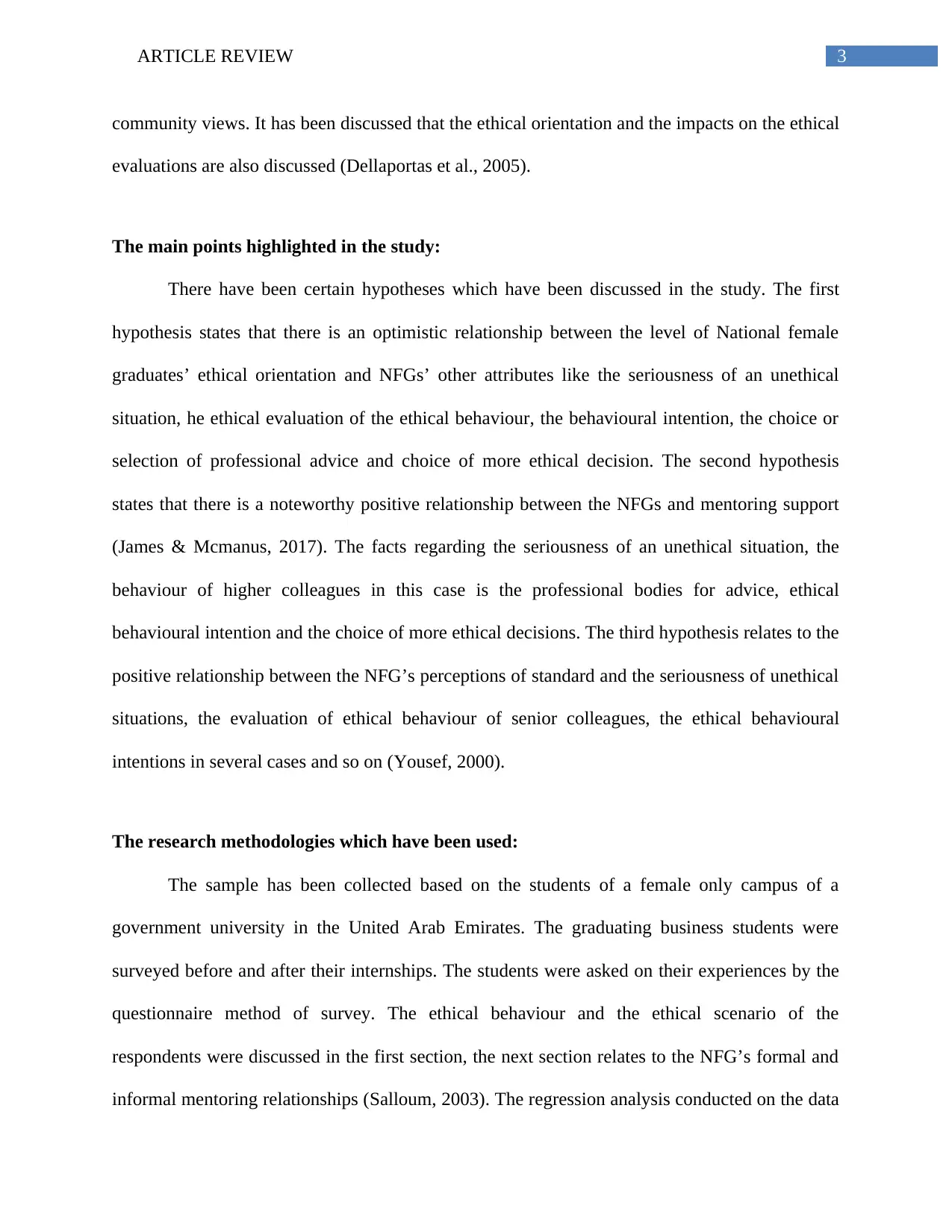
3ARTICLE REVIEW
community views. It has been discussed that the ethical orientation and the impacts on the ethical
evaluations are also discussed (Dellaportas et al., 2005).
The main points highlighted in the study:
There have been certain hypotheses which have been discussed in the study. The first
hypothesis states that there is an optimistic relationship between the level of National female
graduates’ ethical orientation and NFGs’ other attributes like the seriousness of an unethical
situation, he ethical evaluation of the ethical behaviour, the behavioural intention, the choice or
selection of professional advice and choice of more ethical decision. The second hypothesis
states that there is a noteworthy positive relationship between the NFGs and mentoring support
(James & Mcmanus, 2017). The facts regarding the seriousness of an unethical situation, the
behaviour of higher colleagues in this case is the professional bodies for advice, ethical
behavioural intention and the choice of more ethical decisions. The third hypothesis relates to the
positive relationship between the NFG’s perceptions of standard and the seriousness of unethical
situations, the evaluation of ethical behaviour of senior colleagues, the ethical behavioural
intentions in several cases and so on (Yousef, 2000).
The research methodologies which have been used:
The sample has been collected based on the students of a female only campus of a
government university in the United Arab Emirates. The graduating business students were
surveyed before and after their internships. The students were asked on their experiences by the
questionnaire method of survey. The ethical behaviour and the ethical scenario of the
respondents were discussed in the first section, the next section relates to the NFG’s formal and
informal mentoring relationships (Salloum, 2003). The regression analysis conducted on the data
community views. It has been discussed that the ethical orientation and the impacts on the ethical
evaluations are also discussed (Dellaportas et al., 2005).
The main points highlighted in the study:
There have been certain hypotheses which have been discussed in the study. The first
hypothesis states that there is an optimistic relationship between the level of National female
graduates’ ethical orientation and NFGs’ other attributes like the seriousness of an unethical
situation, he ethical evaluation of the ethical behaviour, the behavioural intention, the choice or
selection of professional advice and choice of more ethical decision. The second hypothesis
states that there is a noteworthy positive relationship between the NFGs and mentoring support
(James & Mcmanus, 2017). The facts regarding the seriousness of an unethical situation, the
behaviour of higher colleagues in this case is the professional bodies for advice, ethical
behavioural intention and the choice of more ethical decisions. The third hypothesis relates to the
positive relationship between the NFG’s perceptions of standard and the seriousness of unethical
situations, the evaluation of ethical behaviour of senior colleagues, the ethical behavioural
intentions in several cases and so on (Yousef, 2000).
The research methodologies which have been used:
The sample has been collected based on the students of a female only campus of a
government university in the United Arab Emirates. The graduating business students were
surveyed before and after their internships. The students were asked on their experiences by the
questionnaire method of survey. The ethical behaviour and the ethical scenario of the
respondents were discussed in the first section, the next section relates to the NFG’s formal and
informal mentoring relationships (Salloum, 2003). The regression analysis conducted on the data
Paraphrase This Document
Need a fresh take? Get an instant paraphrase of this document with our AI Paraphraser
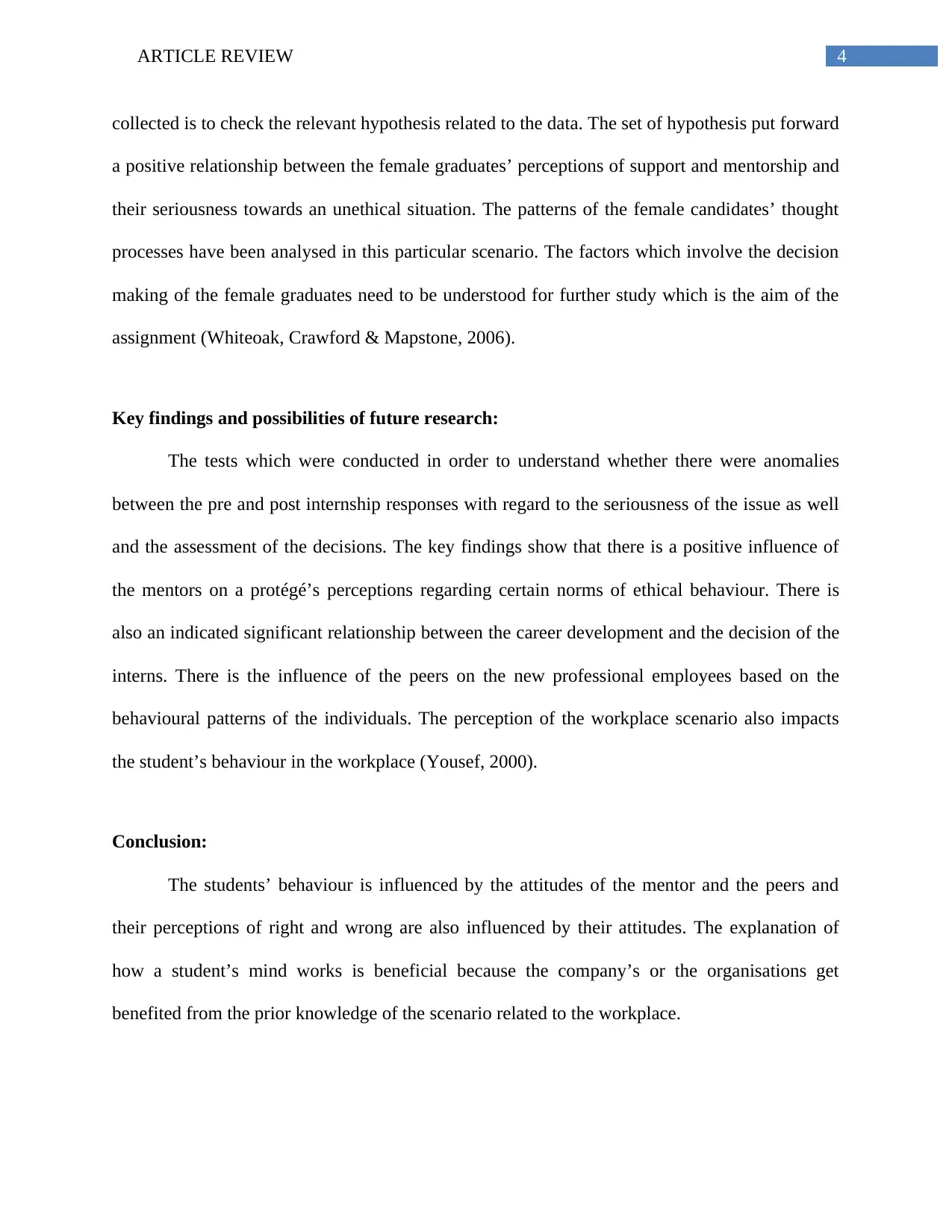
4ARTICLE REVIEW
collected is to check the relevant hypothesis related to the data. The set of hypothesis put forward
a positive relationship between the female graduates’ perceptions of support and mentorship and
their seriousness towards an unethical situation. The patterns of the female candidates’ thought
processes have been analysed in this particular scenario. The factors which involve the decision
making of the female graduates need to be understood for further study which is the aim of the
assignment (Whiteoak, Crawford & Mapstone, 2006).
Key findings and possibilities of future research:
The tests which were conducted in order to understand whether there were anomalies
between the pre and post internship responses with regard to the seriousness of the issue as well
and the assessment of the decisions. The key findings show that there is a positive influence of
the mentors on a protégé’s perceptions regarding certain norms of ethical behaviour. There is
also an indicated significant relationship between the career development and the decision of the
interns. There is the influence of the peers on the new professional employees based on the
behavioural patterns of the individuals. The perception of the workplace scenario also impacts
the student’s behaviour in the workplace (Yousef, 2000).
Conclusion:
The students’ behaviour is influenced by the attitudes of the mentor and the peers and
their perceptions of right and wrong are also influenced by their attitudes. The explanation of
how a student’s mind works is beneficial because the company’s or the organisations get
benefited from the prior knowledge of the scenario related to the workplace.
collected is to check the relevant hypothesis related to the data. The set of hypothesis put forward
a positive relationship between the female graduates’ perceptions of support and mentorship and
their seriousness towards an unethical situation. The patterns of the female candidates’ thought
processes have been analysed in this particular scenario. The factors which involve the decision
making of the female graduates need to be understood for further study which is the aim of the
assignment (Whiteoak, Crawford & Mapstone, 2006).
Key findings and possibilities of future research:
The tests which were conducted in order to understand whether there were anomalies
between the pre and post internship responses with regard to the seriousness of the issue as well
and the assessment of the decisions. The key findings show that there is a positive influence of
the mentors on a protégé’s perceptions regarding certain norms of ethical behaviour. There is
also an indicated significant relationship between the career development and the decision of the
interns. There is the influence of the peers on the new professional employees based on the
behavioural patterns of the individuals. The perception of the workplace scenario also impacts
the student’s behaviour in the workplace (Yousef, 2000).
Conclusion:
The students’ behaviour is influenced by the attitudes of the mentor and the peers and
their perceptions of right and wrong are also influenced by their attitudes. The explanation of
how a student’s mind works is beneficial because the company’s or the organisations get
benefited from the prior knowledge of the scenario related to the workplace.
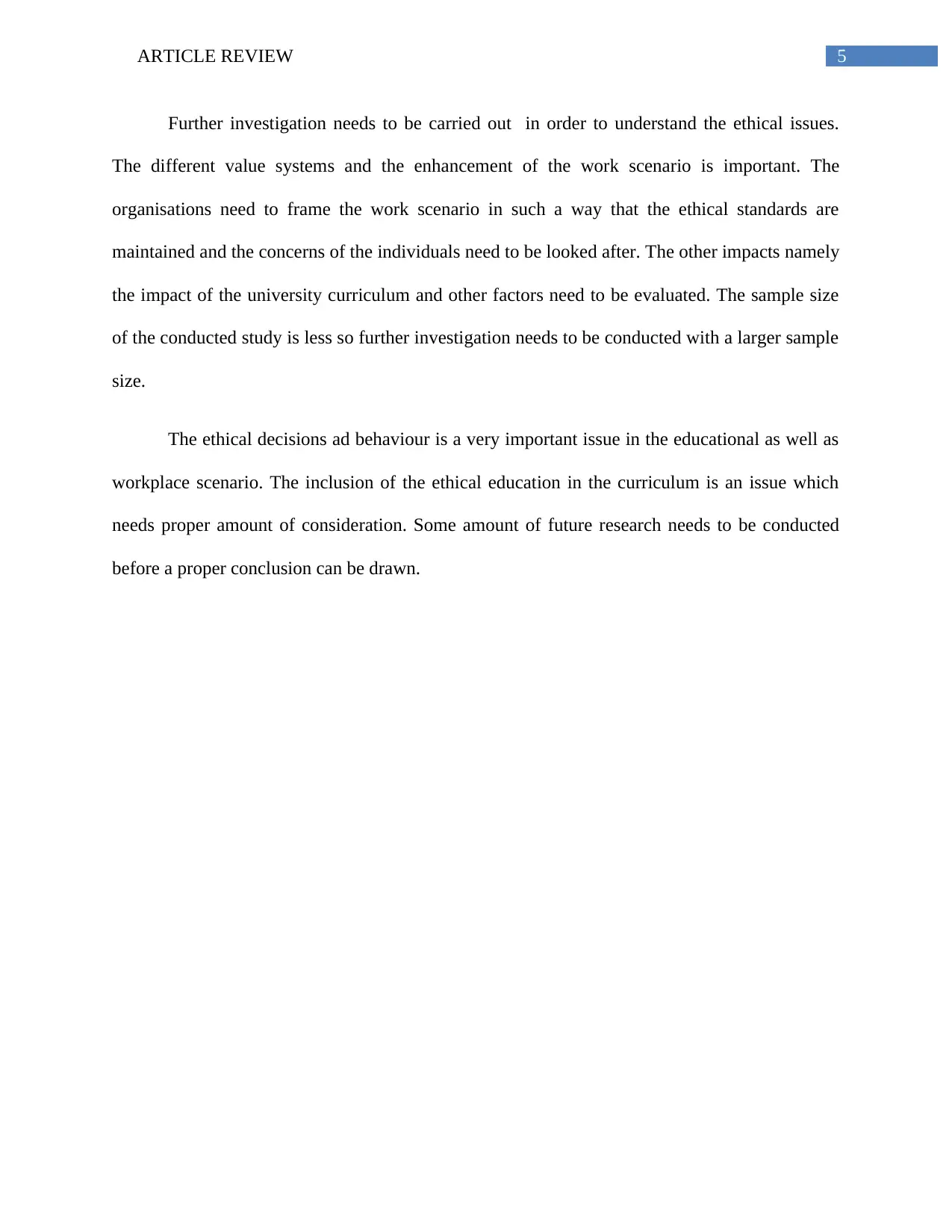
5ARTICLE REVIEW
Further investigation needs to be carried out in order to understand the ethical issues.
The different value systems and the enhancement of the work scenario is important. The
organisations need to frame the work scenario in such a way that the ethical standards are
maintained and the concerns of the individuals need to be looked after. The other impacts namely
the impact of the university curriculum and other factors need to be evaluated. The sample size
of the conducted study is less so further investigation needs to be conducted with a larger sample
size.
The ethical decisions ad behaviour is a very important issue in the educational as well as
workplace scenario. The inclusion of the ethical education in the curriculum is an issue which
needs proper amount of consideration. Some amount of future research needs to be conducted
before a proper conclusion can be drawn.
Further investigation needs to be carried out in order to understand the ethical issues.
The different value systems and the enhancement of the work scenario is important. The
organisations need to frame the work scenario in such a way that the ethical standards are
maintained and the concerns of the individuals need to be looked after. The other impacts namely
the impact of the university curriculum and other factors need to be evaluated. The sample size
of the conducted study is less so further investigation needs to be conducted with a larger sample
size.
The ethical decisions ad behaviour is a very important issue in the educational as well as
workplace scenario. The inclusion of the ethical education in the curriculum is an issue which
needs proper amount of consideration. Some amount of future research needs to be conducted
before a proper conclusion can be drawn.
⊘ This is a preview!⊘
Do you want full access?
Subscribe today to unlock all pages.

Trusted by 1+ million students worldwide
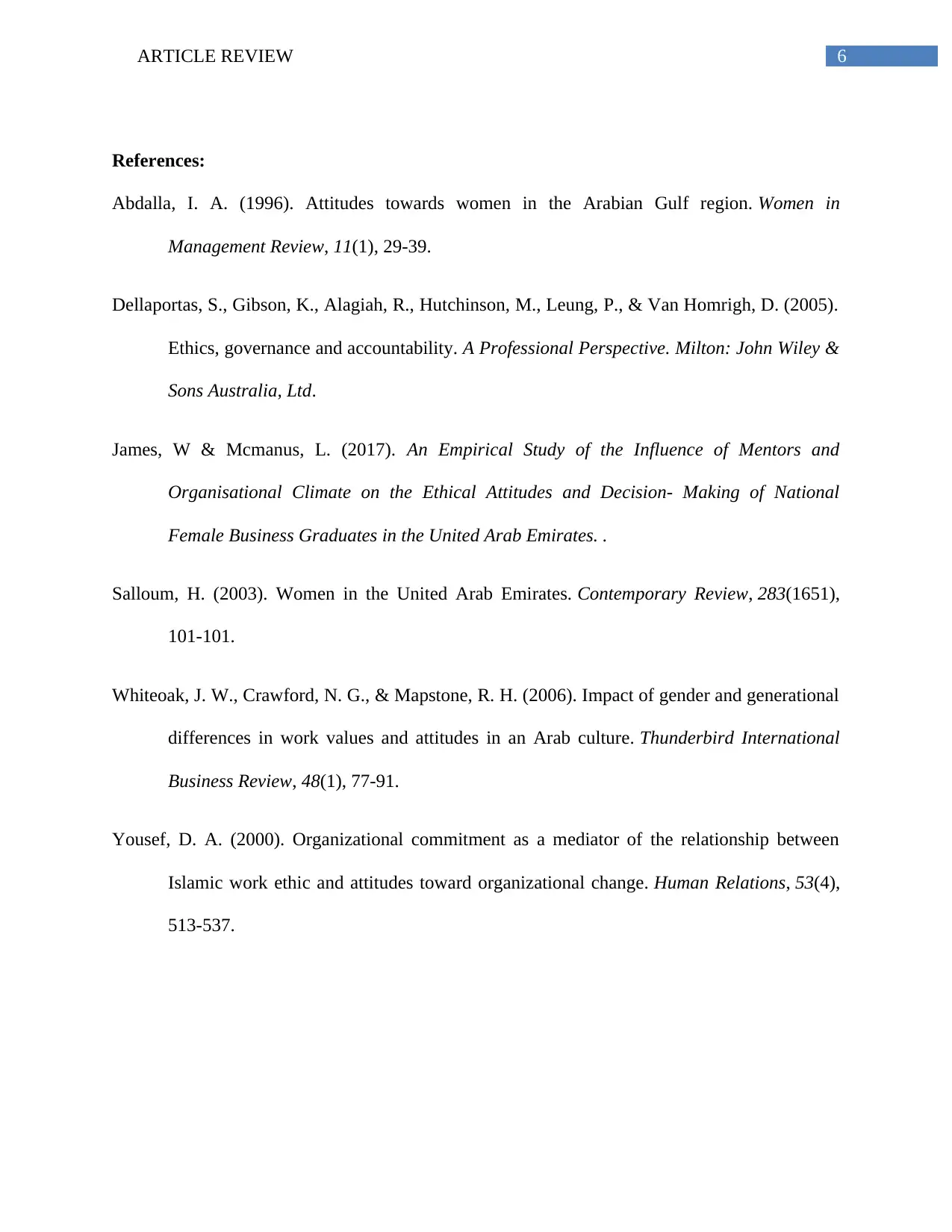
6ARTICLE REVIEW
References:
Abdalla, I. A. (1996). Attitudes towards women in the Arabian Gulf region. Women in
Management Review, 11(1), 29-39.
Dellaportas, S., Gibson, K., Alagiah, R., Hutchinson, M., Leung, P., & Van Homrigh, D. (2005).
Ethics, governance and accountability. A Professional Perspective. Milton: John Wiley &
Sons Australia, Ltd.
James, W & Mcmanus, L. (2017). An Empirical Study of the Influence of Mentors and
Organisational Climate on the Ethical Attitudes and Decision- Making of National
Female Business Graduates in the United Arab Emirates. .
Salloum, H. (2003). Women in the United Arab Emirates. Contemporary Review, 283(1651),
101-101.
Whiteoak, J. W., Crawford, N. G., & Mapstone, R. H. (2006). Impact of gender and generational
differences in work values and attitudes in an Arab culture. Thunderbird International
Business Review, 48(1), 77-91.
Yousef, D. A. (2000). Organizational commitment as a mediator of the relationship between
Islamic work ethic and attitudes toward organizational change. Human Relations, 53(4),
513-537.
References:
Abdalla, I. A. (1996). Attitudes towards women in the Arabian Gulf region. Women in
Management Review, 11(1), 29-39.
Dellaportas, S., Gibson, K., Alagiah, R., Hutchinson, M., Leung, P., & Van Homrigh, D. (2005).
Ethics, governance and accountability. A Professional Perspective. Milton: John Wiley &
Sons Australia, Ltd.
James, W & Mcmanus, L. (2017). An Empirical Study of the Influence of Mentors and
Organisational Climate on the Ethical Attitudes and Decision- Making of National
Female Business Graduates in the United Arab Emirates. .
Salloum, H. (2003). Women in the United Arab Emirates. Contemporary Review, 283(1651),
101-101.
Whiteoak, J. W., Crawford, N. G., & Mapstone, R. H. (2006). Impact of gender and generational
differences in work values and attitudes in an Arab culture. Thunderbird International
Business Review, 48(1), 77-91.
Yousef, D. A. (2000). Organizational commitment as a mediator of the relationship between
Islamic work ethic and attitudes toward organizational change. Human Relations, 53(4),
513-537.
1 out of 7
Related Documents
Your All-in-One AI-Powered Toolkit for Academic Success.
+13062052269
info@desklib.com
Available 24*7 on WhatsApp / Email
![[object Object]](/_next/static/media/star-bottom.7253800d.svg)
Unlock your academic potential
Copyright © 2020–2026 A2Z Services. All Rights Reserved. Developed and managed by ZUCOL.





